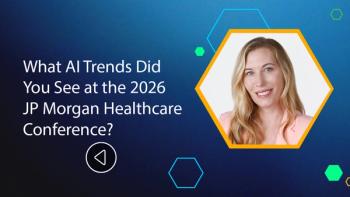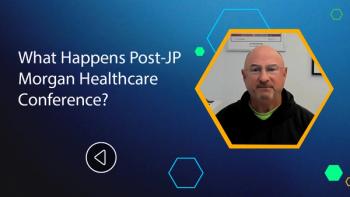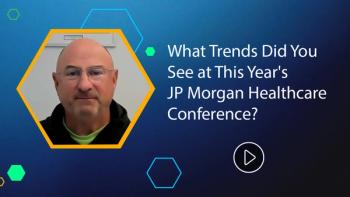
Leveraging Technology and Data for Personalized Fertility Treatment
In this part of his Pharmaceutical Executive video interview, Dr. Lawrence B. Werlin, MD, FACOG of HRC Fertility (@md.lawrence.werlin on TikTok), talks about advancements in technology and data analysis that could lead to more personalized fertility treatments.
In this Pharmaceutical Executive video interview, Dr. Lawrence B. Werlin, MD, FACOG of HRC Fertility (
How can advancements in technology and data analysis lead to more personalized fertility treatments?
I tell this to my patients as well, all 32-year-old women aren't the same, all 40-year-old women, aren't the same. Everybody is different. So, what is it that I need to help individualize your potential care. There's a workup that you do that helps you to get some basic information, that gives you some leeway in into how you make appropriate protocols for that individual patient. And it's really the workup that's actually the most important. And when we evaluate the couple, we do it as a couple. So, for example, with respect to the male, we'll always look at a sperm analysis. We'll look to see that he has sperm, that they move appropriately, that they look normal, that there are no signs of infection, poor count or motility, poor shape infection, all inhibit sperm’s ability to penetrate an egg. So, it's important to know that beforehand, so that if you need to get therapy for that, you can with respect to the woman. We reevaluate them.
Women are born with all their eggs. They're born with about 2 million eggs, and by the time they start their first period, they have about 400,000 eggs left. So, from age zero to your first period, 80% of your eggs are gone. That process goes on every single month, the eggs that you have sit in these little structures, which are called follicles, and you have two kinds of follicles that exist. One group are called antral follicles, those are the follicles that have the potential to develop in that given month. And the other group of follicles that you have are called primordial follicles, which are those that are in your reserve or in your gas tank. So, every month, you call up some number of antral follicles. Whatever number that is yours; it'll be different than your sister, different than your best friend. It is whatever it is for you. If you don't take any fertility meds, you only make one dominant follicle. That dominant follicle sends out inhibitors and prevents the other follicles from developing. But at the end of that month, if you're not pregnant, all of those follicles that had the potential to develop are gone.
So, when we do a process like IVF or fertility preservation, where we're going to freeze your eggs, we override that dominant follicle mechanism and try and call up everything that's available in that particular cycle. So typically, we have patients come in on day two or three of their cycle, day one being the first day of red blood flow, and we look at some hormone testing, we look at estradiol, we look at FSH, and we look at LH, because those three hormones correlate well with their antral count, and they're the only three, by the way, that have to be done on a specific day. Then there are a number of other hormones that we look at that are not cycle day specific, meaning you could do it any day of the cycle. The most important one is called AMH. AMH stands for anti-malaria hormone. That's the hormone that tells me about your reserve. Doesn't tell me that you have 100,000 eggs or 50 eggs or five eggs. It's a lab value, and depending on your age group, that lab value will be somewhere between 0.16 and maybe 13. At the highest, you'll fall somewhere in that range. The closer you fall to that 0.16 The fewer the eggs you have in reserve. So that's important for me to know.
We also will look at your thyroid function. The most common medical hormone abnormality that occurs in young people of reproductive age is low thyroid function, and the most common reason why it occurs is that you make antibodies or hostilities to your thyroid. It's called autoimmune thyroiditis, or Hashimoto’s disease. And then we also look at a hormone called prolactin. Prolactin is a hormone that comes from your pituitary gland, which sits right back up here from your nose, and it stimulates your breast to make milk. So, women, of course, who are pregnant, will have very high levels of prolactin. But in the non-pregnant state, it should be normal, but there are conditions where it could be elevated, and it can interfere with normal ovulatory function.
The most common other entity that's associated with that is actually low thyroid function, which is why we do those together, and then the other the final one we look at, is vitamin D. Vitamin D is important in egg development, embryo development and pregnancy. You would think to yourself that living in Southern California where 300 days a year, the sun is out, and if you go out for half an hour a day and get exposed to UV light, that should activate the vitamin D in your skin, but I can tell you that about 85% of the people I see have low vitamin D. They wear sunblock, they wear long sleeves, they wear jeans, they don't go out. Whatever the case may be, Vitamin D is a factor. So, we look at those things to help us get a scenario where we are.
And the other thing that I think is important to look at are carrier screens. Carrier screens are screening bloods that look to see if you and your partner share any recessive traits. First of all, we all carry certain recessive things just because of heredity, right? There's just a fact. The critical thing is that you don't share something with your partner. Let me give you an example. Let's say that you were a carrier for non-syndromic hearing loss, where you hear me. Fine. You don't have the disease, but you're a carrier for it. Now you test your partner, and you find out that your partner is also a carrier. So, neither of you have the disease. You're both carriers. But now if you make a baby, there's a 25% risk that that baby will be deaf. You would want to know that certainly before you even tried to get pregnant, certainly if you were trying to get pregnant on your own, you'd want to be prepared for, you know, if something like that should occur. But more importantly, if you were trying to get pregnant, you could then use IVF and use genetic testing to test for that specific abnormality and prevent a hereditary disease from occurring. So, you try and put all of these things together and get information on that couple so that you can give them the best protocol for them and the best opportunities for them to achieve a successful pregnancy.
I think that with the advent of AI — first of all, let me just say that being with a physician, dealing with your physician, interacting with your physician, will always be the primary thing that you need to do. You know, being able to interact and speak to your physician and deal with them directly will always be the most important thing that you can do. But with technology like AI coming through, there can be some significant benefits to it. And you know, for example, let's say a patient presents with certain clinical factors that you need to know. Typically, when you think about those things, you do it in your own mind, where you think about, you know, well, if this occurred, then I'm expecting that I would see this, and you try and deal with that with AI. You can take those symptoms, put them into an algorithm, and they will search, not only what you know, but they will search the literature. They will search you know other things that are available that you may not have, and give you a much better and a much more enhanced differential diagnosis than you would have started out with, and also may give you information about what they think may be better treatments you as the physician and the patient, make the ultimate decisions, but having as much information as you can get to make those decisions is always beneficial.
Newsletter
Lead with insight with the Pharmaceutical Executive newsletter, featuring strategic analysis, leadership trends, and market intelligence for biopharma decision-makers.




